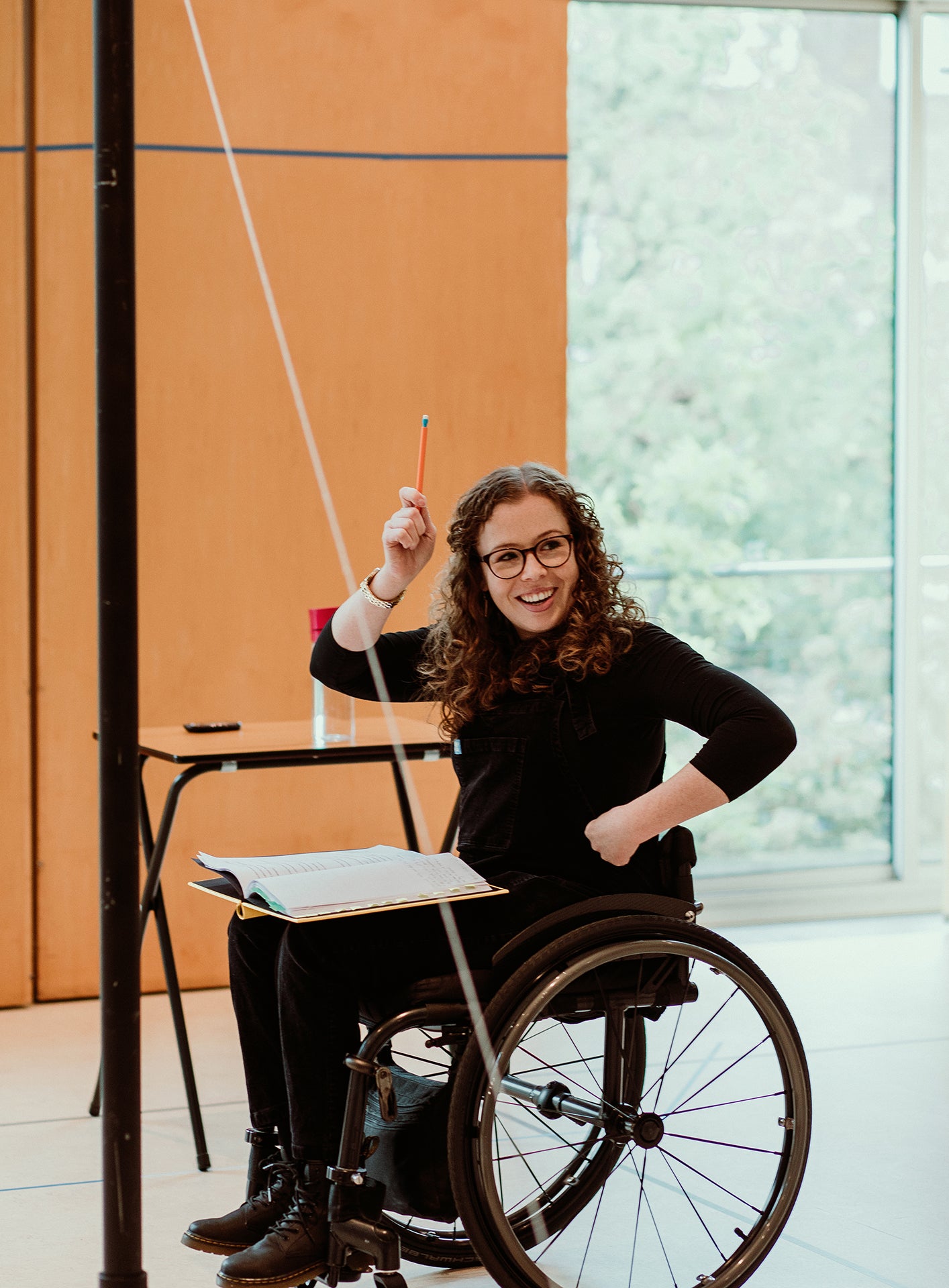Amy Trigg: ‘Every disabled person in the industry gets put up for one role’
The winner of the Women’s Prize for Playwriting 2020, ‘Reasons You Should(n’t) Love Me’ is a hilariously honest look at life for a young woman with spina bifida. Its writer and star Amy Trigg tells Isobel Lewis about her first time seeing disabled actors on stage, playing a character that’s a little bit like yourself and how Covid has actually helped improve accessibility


Amy Trigg didn’t see anyone who looked like her on stage or screen growing up. The actor and writer, who was born with spina bifida (a condition where the spine doesn’t develop in the womb), counts Tanni Grey-Thompson’s autobiography among her limited cultural exposure to people who also used wheelchairs. Trigg had no Paralympic ambitions, sure, but she took what she could get. Now, she’s looking to right these wrongs with her new play Reasons You Should(n’t) Love Me, which opens at London’s Kiln Theatre this week.
A one-woman show, the darkly comic play follows Juno, a young woman with spina bifida, as she looks back on her life so far. It’s a show about disability, but also one about love and a desire to be loved by the people around us. While Trigg points out that being disabled has naturally had “an effect on everything I do without me realising it, in good ways and bad ways and then all the other ways”, the story is universal.
Given that Juno voices all the other characters, you might assume that Reasons You Should(n’t) Love Me is autobiographical. But while there are “obviously similarities”, Trigg is not Juno. She hopes to see other actors play the role in the future – although admittedly the show requires a “slim casting bracket”. It’s something she would never compromise on. As the script’s character breakdown reads: “Juno should be played by a disabled actress. If you can’t find a disabled actress, then look a bit harder.”
For audience members without knowledge of spina bifida, the show, which won the 2020 Women’s Prize for Playwriting, cleverly slots in nuggets of knowledge alongside the first kisses and awkward doctor’s appointments. But while Juno at one point gives her own mini-TED Talk about the condition, Trigg knew she didn’t want to “hit people on the head with it”. Where the actor struggled not being able to go to house parties growing up because she couldn’t always get inside the building, a teenage Juno’s friends fashion her a makeshift ramp.
It wasn’t until she was studying musical theatre at Mountview – where she was the first wheelchair user to attend – that Trigg first saw disabled actors on stage with the deaf and disabled theatre company Graeae. “It was obviously happening [before], it’s just I wasn’t exposed to it, which is a bit wild because… I was kind of their target audience,” she adds, with a laugh.
Studying at drama school naturally “came with its challenges”, but Trigg felt well supported during her three years there. If anything, it was the rest of the industry that needed to catch up. It soon became clear that the few musical theatre parts she thought were “maybe available” to wheelchair users, such as Nessarose in Wicked or Madame Armfeldt in Sondheim’s A Little Night Music, weren’t. There were issues “regarding access and the storylines and what the characters needed to be able to do”. Nessarose learns to walk at the end of Wicked. Most disabled actors don’t have that luxury.

Trigg has seen things improve over the years and doesn’t want to put down companies who are “trying hard” to improve the visibility of disabled actors. The issue is that casting disabled actors on stage is often an afterthought. “There aren’t many people at the top that are disabled so naturally the work that happens doesn’t always have diversity at its heart in that respect,” she explains.
Somewhat ironically, institutions like the The Globe and the Royal Shakespeare Company – for whom Trigg starred in The Taming of the Shrew and Measure for Measure – are often the ones leading the way when it comes to getting deaf and disabled actors on stage. But there’s still a way to go, with casting calls still coming through where “disabled” is the only character descriptor. “You want to turn around to people and be like, ‘I don’t know every disabled person in the industry’, but because it’s so small, you do,” she says. “And [we’re all up] for this one role and they haven’t decided what they want to do with it.”
Discussions around accessibility in theatre are long overdue. It took a pandemic for the conversation to accelerate – as creatives were forced to prioritise digital theatre. And while many people may complain about Zoom fatigue, Trigg says that the ability to hold meetings online as opposed to at “inaccessible offices” has been a blessing. “I’ve managed to do so much more in the last few months than I would have done normally, which sounds wrong, but that’s the way it’s worked out for me,” she says.
While Trigg has always been lucky to see a lot of theatre, those unable – both physically and financially – to get in the room, finally had a chance in the lawless world of internet theatre. With venues reopening their doors this month, she’s “quietly confident” that these changes will stick. “I’m aware that I might need to be a little bit patient and keep raising my voice every now and then, remembering to speak up,” she says. “I’m just hoping that we will take all the lessons we’ve learned over the last year or so and build on it.”
‘Reasons You Should(n’t) Love Me’ runs at the Kiln Theatre from 21 May to 12 June

Join our commenting forum
Join thought-provoking conversations, follow other Independent readers and see their replies
Comments